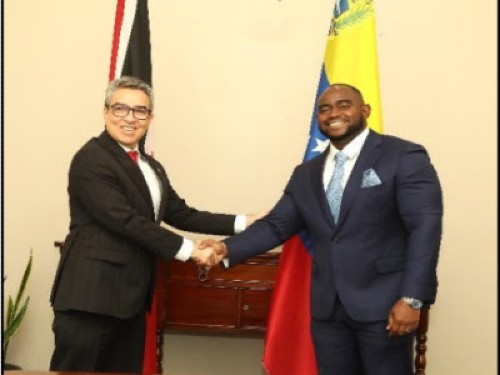PORT OF SPAIN, Trinidad - Trinidad and Tobago and Venezuela Monday agreed “to open diplomatic channels” in light of “recent events” as both countries “recognized the importance of the longstanding fraternal relationship as neighboring countries”.
 Minister of Foreign and CARICOM Affairs, Sean Sobers, greets Venezuelan Ambassador Álvaro Sánchez Cordero, during a courtesy call on Monday (Ministry of Foreign Affairs Photo) th June, 2025.A statement issued by the Ministry of Foreign and CARICOM Affairs said that the minister, Sean Sobers, held talks with Venezuela’s ambassador to Trinidad and Tobago Álvaro Sánchez Corder, who paid a “courtesy call” and that “during the meeting, Minister Sobers and Ambassador Sánchez recognized the importance of the longstanding fraternal relationship as neighboring countries that share strong cultural and historical ties.
Minister of Foreign and CARICOM Affairs, Sean Sobers, greets Venezuelan Ambassador Álvaro Sánchez Cordero, during a courtesy call on Monday (Ministry of Foreign Affairs Photo) th June, 2025.A statement issued by the Ministry of Foreign and CARICOM Affairs said that the minister, Sean Sobers, held talks with Venezuela’s ambassador to Trinidad and Tobago Álvaro Sánchez Corder, who paid a “courtesy call” and that “during the meeting, Minister Sobers and Ambassador Sánchez recognized the importance of the longstanding fraternal relationship as neighboring countries that share strong cultural and historical ties.
“Both sides also discussed matters of mutual interest and concern, inclusive of recent events with Minister Sobers reiterating the Government of the Republic Trinidad and Tobago’s previous request for information from the Government of the Bolivarian Republic of Venezuela,” the statement said without elaborating.
Last Friday, the Venezuela government expressed “its profound surprise at the irate and unjustified reaction” of the Trinidad and Tobago government in response to what it termed as “ a legitimate complaint” by President Maduro about the attempts to overthrow his administration by mercenaries using Trinidad and Tobago.
“Venezuela has captured criminals of Trinidadian origin, who have confessed their plans, statements that have been duly supported with compelling evidence presented by the competent authorities,” Caracas said in a statement.
Last Thursday night, Prime Minister Kamla Persad Bissessar said that it took “very seriously” threats being made by Venezuela to track down any person outside of the South American country.
She told a post Cabinet news conference that she had also been aware of statements made by Venezuelan Justice Minister, Diosdado Cabello, that a Trinidad and Tobago national was involved in “terrorist activities” aimed at destabilizing Venezuela earlier this week.
Cabello has since identified the Trinidadian national as “Gis Kendel Jheron,” and repeated accusations made by President Maduro that “terrorists” including Colombians, had used Trinidad and Tobago as a launching pad in the bid to destabilize the Venezuelan government.
Cabello has vowed to pursue anyone attempting to destabilize Venezuela, saying “there must be justice."
“We are going after the gangs, wherever they are and wherever they are. Together, we will guarantee peace in this country,” he said.
But Prime Minister Persad Bissessar told reporters that there was no evidence to support the comments made by Cabello, adding “today I want to make it very clear to the Venezuelan government and officials that they can do whatever they want on Venezuelan territory, but they cannot come here.
Trinidad and Tobago police say that the person named by Cabello had not appeared in the country’s criminal database.
The Ministry of Foreign and CARICOM Affairs statement said that “arising out of the discussions, it was agreed that in the spirit of constructive dialogue, open diplomatic channels would be maintained with a view to ensuring that the exchange of information is fair, transparent and consistent”.
Earlier, the left-leaning Movement for Social Justice (MSJ) called on Port of Spain to appoint a special envoy to deal with the allegations made by Venezuela regarding Trinidad and Tobago being used as a launching pad for seeking to overthrow the Nicolas Maduro government in Venezuela.
MSJ leader, David Abdulah, speaking at the party’s weekly virtual news conference, said also that Port of Spain should engage in “back room” diplomacy given that the country does not at the moment have any appointed ambassador to the South American country.
“First of all we want to state that the approach by the Trinidad and Tobago government was not a well advised one and as several people have stated what ought to have happened was a quiet back room diplomacy after the first statement by President Maduro and that simply could have been a reach out through the diplomatic channels to try to ascertain what information, evidence what information and what evidence the Venezuelan authorities in fact have,” Abdulah told reporters.


